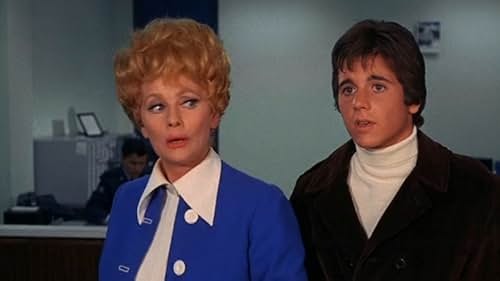
Lucille Ball wasn’t just a groundbreaking comedian; she was a savvy businesswoman who understood the television industry like no one else. While millions tuned in for the laughs and heartwarming moments on I Love Lucy, few realized that Lucille held a unique power over the show’s future — a ‘killswitch’ clause in her contract. This clause gave her sole authority over the show’s potential spin-offs, and it was far more personal than you might think.

The Birth of I Love Lucy’s Spin-Off
The popularity of I Love Lucy was undeniable. After the show’s original run, it only made sense to consider spin-off opportunities. However, Lucille, as both the lead actress and co-owner of Desilu Productions, had a firm grip on how things would proceed. She had always been protective of her creation, and this led to the insertion of an unprecedented clause in her contract.
What Was the ‘Killswitch’ Clause?
The ‘killswitch’ clause gave Lucille complete control over any spin-offs or reboots of the show. Unlike typical clauses that protect intellectual property or royalties, this was something much more personal. It wasn’t just about the show’s brand or her financial stake — it was about how Lucille wanted to be remembered and how her legacy would unfold in future productions.
Lucille’s Fear of Losing Control
Lucille had built I Love Lucy from the ground up. Her fear wasn’t just about losing creative control, but losing the emotional attachment she had to the characters, especially her own portrayal of Lucy Ricardo. She didn’t want anyone to tarnish the image of the character she so lovingly portrayed for years. The ‘killswitch’ clause allowed her to protect the image of Lucy from ever being misused or altered in ways that didn’t align with her vision.

The Personal Connection Behind the Clause
Many who knew Lucille personally said that this clause was more than just a business decision — it was deeply personal. Lucille had poured her heart and soul into I Love Lucy, and the thought of someone else taking over her legacy was something she simply couldn’t bear. This clause was her way of ensuring that the essence of Lucy Ricardo would remain intact.
The Role of Desi Arnaz in the Decision
Although Lucille and Desi Arnaz had a tumultuous marriage, they were always a team when it came to the show. Desi, who co-owned Desilu Productions with Lucille, understood her attachment to the character. He supported her decision to implement the ‘killswitch’ clause, knowing that the show was more than just a job for Lucille — it was her life’s work.
Why Was the Clause So Unusual?
In the world of television contracts, such personal control is rare. Most actors don’t have the level of influence that Lucille did, which made her contract one-of-a-kind. While the ‘killswitch’ clause seemed strange at the time, it was a testament to Lucille’s foresight and understanding of how television could evolve.
Impact on Future Spin-Offs and Reboots
The clause had a significant impact on any potential spin-offs. Although there were a few attempts to revive the I Love Lucy universe, Lucille’s clause prevented any major deviations from the original show. This meant that any new projects had to adhere strictly to her vision, or they wouldn’t happen at all.
The Limited Spin-Offs that Survived
There were a few spin-offs that Lucille allowed, most notably The Lucy-Desi Comedy Hour. However, these were closely monitored by Lucille to ensure that they maintained the spirit of the original series. Anything that ventured too far from the core essence of the characters or the storyline was immediately vetoed by Lucille, thanks to her contractual power.
Lucille Ball’s Influence on Modern TV Contracts
Lucille’s unprecedented control over her spin-offs has influenced how modern television contracts are written. Today, more actors are seeking creative control and influence over their characters, much like Lucille did. Her savvy understanding of the business side of television paved the way for actors to have a stronger voice in their own legacies.
Why the ‘Killswitch’ Clause Still Matters Today
The ‘killswitch’ clause remains relevant in today’s television landscape. With the rise of reboots and revivals, Lucille’s approach serves as a reminder of the importance of protecting creative integrity. Many actors and producers now negotiate for similar clauses to ensure that their work is not altered beyond recognition.
Lucille Ball: A Pioneer in TV Business
Beyond her talents as a comedian, Lucille was a pioneer in the television industry. She was one of the first women to own a production company, and her business acumen was just as sharp as her comedic timing. The ‘killswitch’ clause was a bold move that demonstrated her commitment to maintaining control over her legacy.
The Legacy of I Love Lucy and Its Spin-Offs
Today, I Love Lucy remains one of the most beloved sitcoms in television history. While the spin-offs may not have achieved the same level of success, they are a testament to Lucille’s enduring influence on the industry. Her decision to include the ‘killswitch’ clause ensured that the show’s legacy would remain untarnished, even decades after its original airing.
Conclusion: Lucille Ball’s Enduring Power Over Her Legacy
Lucille Ball’s decision to include a ‘killswitch’ clause in her contract was not just a power move; it was a deeply personal way of safeguarding her legacy. Her control over the spin-offs ensured that I Love Lucy remained true to its original vision and that the character of Lucy Ricardo would never be altered beyond recognition. In doing so, Lucille set a precedent for future generations of actors to take ownership of their creative work, leaving a lasting impact on the television industry.